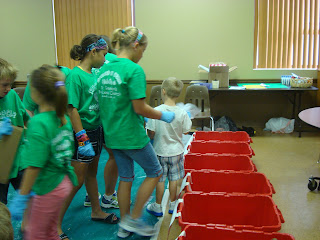Proper 19B. Proverbs 1:20-33
A sampling of this week’s stories about our changing climate
and its effects include these about this year’s record number of extreme
weather events:
· Andrew Freedman reported 2012 Has Had Most Extreme Weather on Record for U.S. on Climate Central.
Kelly Levin posted Timeline: Extreme Weather Events in 2012 on the World Resources Institute’s WRI Insights website. Along with giving a useful visual representation of some of this year’s extreme weather events around the world, the timeline includes the dates of some of the scientific reports connecting extreme weather events and climate change.
Kelly Levin posted Timeline: Extreme Weather Events in 2012 on the World Resources Institute’s WRI Insights website. Along with giving a useful visual representation of some of this year’s extreme weather events around the world, the timeline includes the dates of some of the scientific reports connecting extreme weather events and climate change.
There were several stories this week
about the astonishing Arctic sea ice melt this summer. A few of them are:
· A report from Nature entitled Ice loss shifts Arctic cycles that looks at the effects of these changes in the Arctic on ocean circulation,
ecological systems, and atmospheric pressure, all of which entail global effects.
Climate Central posted ‘Astonishing’ Ice Melt May Lead to More Extreme Winters which discusses how this record loss of ice could affect winter weather in Europe and North America this year. An increase in extreme weather events is expected with changes in the jet stream.
A post from John Vidal aboard the Greenpeace ship Arctic Sunrise suggests that the reported record ice melt may in fact be underestimating the amount of the melt. The Arctic Sunrise was traveling through an area that the data indicated was still covered with ice, but is actually about 50% melted.
Climate Central posted ‘Astonishing’ Ice Melt May Lead to More Extreme Winters which discusses how this record loss of ice could affect winter weather in Europe and North America this year. An increase in extreme weather events is expected with changes in the jet stream.
A post from John Vidal aboard the Greenpeace ship Arctic Sunrise suggests that the reported record ice melt may in fact be underestimating the amount of the melt. The Arctic Sunrise was traveling through an area that the data indicated was still covered with ice, but is actually about 50% melted.
Shifting from the Arctic to the
warm waters of the Caribbean, this week brought a report that
coral reefs in the Caribbean are “on the brink” of collapse from warming waters
and increasing ocean acidity. When coral reefs collapse, entire marine eco-systems
collapse.
Our Sunday lesson from Proverbs (Proverbs1:20-33) is in the voice of Wisdom warning as a prophet warns that scoffing at
wisdom results in disaster. Given the warnings we tend to push aside and
ignore, these words from Wisdom might get our attention: “I also will laugh at your calamity…when
panic strikes you like a storm, and your calamity comes like a whirlwind, when
distress and anguish come upon you.”
Given what is happening to the
Arctic, to the oceans, to the stability of our climate, our complacency seems
irrational. At the end of this passage from Proverbs, Wisdom says that “the
complacency of fools destroys them”. However, “those who listen to me will be
secure and will live at ease, without dread of disaster”.
Nearly every week now brings news
about further evidence of climate change and its dire effects on ecosystems and
the welfare of living things. This week’s passage from Proverbs might help
bring us out of our complacency so we can make wiser choices and mitigate the
effects of climate change. It also helps us on a deeper level. Perhaps those
who listen to wisdom live without dread of disaster not because they will avoid
disaster, but because their wisdom allows them to face disaster with inner
peace.
It suggests that our response as
Christians to climate change is both to do what we can to avoid complacency and
advocate for a reasoned response to climate change, and also – no matter what
choices humanity as whole makes in response to climate change -- to be wise
ourselves, grounded in faith and hope, secure in Christ’s peace.









